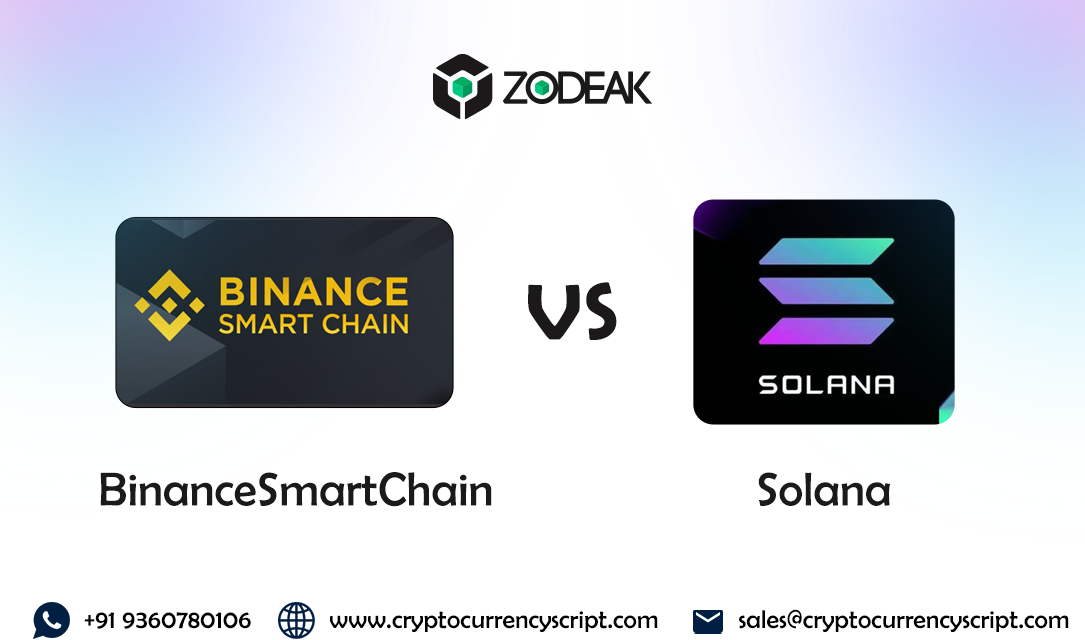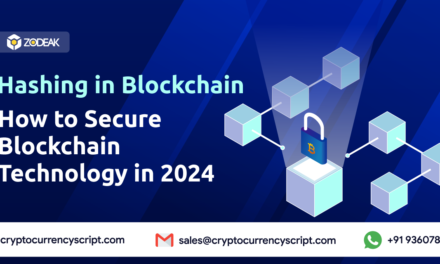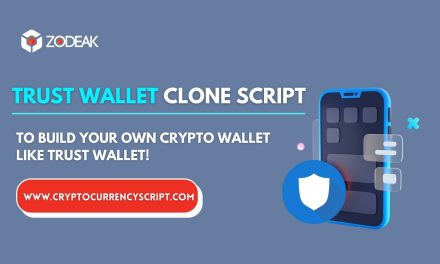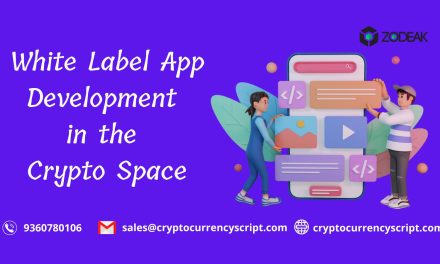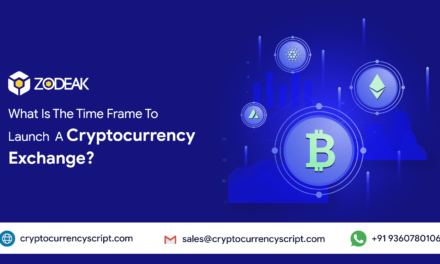In recent years, many businesses and individuals have compared blockchains to build dApps or create tokens for their businesses. They often compare Binance Smart Chain vs Solana and Ethereum vs BSC, Solana vs Ethereum, etc. Of all, Binance Smart Chain vs Solana is the most compared blockchain network in the crypto space.
In this blog, we will first take a glance at both blockchain networks and then focus on their transaction speed, decentralization, smart contract functionality, tokennomics, and security.
Overview of Binance Smart Chain & Solana
Binance Smart Chain (BSC) and Solana both have significant popularity and are extremely well-liked in the crypto and DeFi communities. Binance Smart Chain is a high-performance blockchain launched by the crypto exchange Binance. Solana, on the other hand, is a high-speed blockchain designed for decentralized applications (dApps) and built for scalability.
First, let’s look at BSC’s features, advantages, and disadvantages and then move on to Solana. Finally, we will see BinanceSmartChain vs Solana.
Binance Smart Chain
Binance, the biggest cryptocurrency exchange in the world, launched Binance Smart Chain in September 2020. The platform is compatible with the current Ethereum ecosystem because it is built on the Ethereum Virtual Machine (EVM).
The platform is built to support decentralized applications (dApps) and gives developers the ability to build smart contracts using the Solidity programming language.
Key Features of the Binance Smart Chain
Features of the Binance smart chain include a consensus mechanism, smart contract capabilities, and transaction speed. Let’s look at its features one by one below
Consensus Mechanism
Binance SmartChain uses the latest version of the Proof of Stake (PoS) consensus mechanism, called Proof of Stake Authority (PoSA). PoSA is a hybrid consensus mechanism that combines Proof of Stake and Proof of Authority (PoA) to ensure high transaction efficiency and fast block times.
Smart Contract Capabilities
Binance Smart Chain supports smart contracts and is fully compatible with the Ethereum Virtual Machine (EVM). As a result, programmers can easily port their current Ethereum dApps to the Binance Smart Chain platform.
Also, the platform supports the Solidity programming language and provides developers with many tools and resources to create and deploy smart contracts.
Transaction Speed
High transaction speeds and low transaction costs make Binance Smart Chain an appealing platform for users and developers. The platform has a maximum transaction processing speed (TPS) of 100, which is much higher than Ethereum’s current TPS of 15.
Advantages
- High transaction speeds and low transaction fees
- Compatibility with the existing Ethereum ecosystem
- Support for smart contracts and the Solidity programming language
- Offers a wide range of tools and resources for users & developers
- Backing of Binance, a trusted and reputable cryptocurrency exchange
Disadvantages
- Centralization risks due to the PoSA consensus mechanism
- Lower security compared to Ethereum
Solana Blockchain
Solana is a high-speed blockchain introduced by Solana Labs in March 2020. The platform is designed for decentralized applications (dApps) and built for scalability. Moreover, the platform uses a unique consensus mechanism to ensure high transactions.
Also, it offers features similar to the Binance Smart chain such as a unique consensus mechanism, smart contracts, and high transaction speed.
Let’s see its key features now…
Key Features of the Solana
Consensus Mechanism
Solana uses a unique consensus mechanism Proof of History (PoH) to ensure high transaction efficiency and fast block times. PoH is used to timestamp transactions and create a historical record used by the network to verify transactions.
Smart Contract Capabilities
Solana supports smart contracts and is compatible with the Rust programming language. Also, the platform provides tools and resources for developers to create and deploy smart contracts.
Transaction Speed
Solana offers high transaction speeds, with the ability to process up to 65,000 transactions per second (TPS). Also, this makes it one of the fastest blockchain platforms in the world.
Advantages
- High transaction speeds and low transaction fees
- Scalability, with the ability to process up to 65,000 TPS
- Strong security features, including the use of PoH and other advanced technologies
- Support for smart contracts and the Rust programming language
- Backing of major investors and partnerships with leading companies in the industry
Disadvantages
- Limited ecosystem compared to more established blockchain platforms
- Difficulty in integrating with existing systems due to its unique architecture and consensus mechanism
- Complexity for developers due to the use of Rust programming language
Binance Smart Chain vs Solana Blockchain: Quick Comparison
Both Solana and Binance Smart Chain are blockchain networks that let programmers create decentralized applications (DApps) and release their own cryptocurrencies. However, there are several key differences between these two blockchains that are worth noting.
Here let’s see Binance Smart Chain vs Solana Blockchain below:
| Point of Difference | Binance Smart Chain | Solana blockchain |
|---|---|---|
| Architecture | BSC is an early fork of the Ethereum blockchain & now it is separated. | Solana is a completely new blockchain built from scratch. |
| Consensus Mechanism | Uses the modified version of the Proof of Stake (PoS) consensus mechanism, called Proof of Stake Authority (PoSA). | Uses a unique consensus mechanism called Proof of History that ensures high transaction throughput and faster block times. |
| Transaction Speed | Binance Smart Chain processes up to 100 TPS. | Solana processes up to 65,000 TPS & faster than that BSC. |
| Smart Contract | Supports Smart Contracts and uses the solidity programing language. | Supports Smart Contracts and uses the Rust programming language. |
| Decentralization | A semi-decentralized blockchain with a limited number of validators, and Binance controls most of these validators. | Solana is a more decentralized network, with a larger number of validators and a more diverse set of node operators. |
| Ecosystem | BSC has a large and growing ecosystem of DApps and decentralized finance (DeFi) projects. | Solana ecosystem is still in its infancy but supports DApps and DeFi projects. |
| Transaction fees | It uses a gas payment system that allows users to set their own fees for transactions. | It uses a fee market system, where fees are determined by supply and demand. |
| Interoperability | Support cross-chain interoperability that allows assets to be transferred between different blockchain networks. | Solana also supports cross-chain interoperability and allows assets to be transferred between different blockchains. |
| Tokenomics | BSC has its own native token, BNB, which is used for transaction fees and governance on the network. | Solana has SOL as its native token, which is used for staking, transaction fees, and governance. |
| Development Tools | BSC has more mature and widely-used tools, such as Remix and Truffle. | Solana has its own Rust-based programming language and SDKs. |
| Governance | As Binance has significant control over the network’s decision-making process, BSC’s governance is highly centralized. | Solana has a highly decentralized governance structure that allows for greater community involvement. |
| Environmental Impact | BSC still relies on Proof of Stake, which consumes more energy than Solana’s Proof of History mechanism. | Solana’s consensus mechanism is energy-efficient, consuming less energy compared to BSC. |
| User Base | BSC has a large user base, especially in the DeFi space. Many DeFi products like PancakeSwap & Venus are being launched at BSC. | Solana’s user base is small, but the network is growing rapidly due to fast transaction speeds and low fees. |
These are the differences between Binance Smart Chain vs Solana. Both are innovative blockchain networks that provide unique solutions to various challenges facing the blockchain industry. Ultimately, the choice between Solana and BSC depends on the specific use case and industry.
Wrapping Up!
Hope you get some knowledge on this blog Binance Smart Chain vs Solana. Both platforms have unique qualities that make them suitable for various use cases, so users and developers should carefully consider their requirements before selecting a platform.
However, it is undeniable that Solana and Binance Smart Chain are pushing the envelope of what blockchain technology is capable of, and their continued expansion and development will probably have a significant influence on the future of DeFi and other DApps. That’s it!
If you want to know information about any blockchain, feel free to contact our expert at any time. They are well-versed in blockchain and cryptocurrency exchange development. So they can assist you and share their knowledge for your business.
Subscribe for more blog updates on various blockchains in the future!

